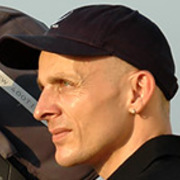
Mark Lapwood
Born and raised in Palmerston North, Mark Lapwood was working in a local photo lab during the school holidays when he photographed a nearby hotel fire. After a chance meeting the next morning he handed his negative to the chief photographer of The Manawatu Standard, who printed his image on the front page. A few months later Lapwood got a job at the newspaper — initially in the darkroom, then as a photographer.
After tiring of the media hype, Lapwood headed south to Christchurch and explored photojournalism through a series of photo stories of people, inspired by Life magazine. He also began playing around with slide shows — mixing still images to music played through a tape recorder. At 20 he relocated to Sydney (his mother is Australian), and managed to channel those very skills into a job at a family-run company. This time the slide shows were for museums and corporate gigs, sometimes using up to 15 projectors simultaneously.
Moving pictures were the next step. Twice on the shortlist to study cinematography at the Australian Film TV and Radio School (AFTRS), Lapwood decided the best alternative was to get practical experience. After nine months working gratis on film school projects and other gigs, he began getting paid work — working his way up the ladder under talented cinematographers like Don McAlpine (Moulin Rouge) and Dion Beebe (Chicago).
In 1998 Lapwood finally got into AFTRS, and began his MA in Cinematography. During two years study he shot 18 short films. Post-graduation, that CV has grown to include hundreds of commercials around the globe, plus more shorts, documentaries, the odd music video (globetrotting Evermore vid Running) and at least eight gongs from the New South Wales branch of the Australian Cinematographers Society.
Soon after graduating, Lapwood took a call from a visiting producer who’d seen him on the AFTRS website. Within six weeks he was in southern India shooting his first movie, controversial coming of age drama Maya. Banned by Indian authorities within days of its commercial unveiling at Cannes, the film went on to win awards in Toronto, Belgium and New York. An award from the Australian Cinematographers Society proved one of his “most memorable, euphoric moments” to date.
Lapwood fell for India — as is clear from his 2007 short film Eclipse, a portrait of Mumbai (Bombay) which premiered at the Tribeca Film Festival and won multiple awards globally. Mumbai would remain his main base for six years, though commercials work took him as far as China and the US, and he has directed ads in Pakistan, Japan and South Korea. In 2004 he shot Singaporean-set drama Cages in HD. A local critic praised the film’s “brilliant” imagery, calling it “quite surreal and strikingly beautiful”.
In 2011 Lapwood returned to New Zealand for feature-length environmental documentary Sky Whisperers Ranginui. He went on to shoot the second season of Māori Television series Songs from the Inside, and was one of the cinematographers on both docudrama The Forgotten General and documentary Whare Tapa Whā (which was also released in feature form as A Place to Call Home).
In 2017 he shot musical short film The Coffin Club, about a Kiwi build-your-own-coffin club which won global media attention. It was made as part of online documentary series Loading Docs.
These days based in Auckland, but with passport ready, Lapwood continues to juggle commercials, drama, and non-fiction.
Updated on 3 June 2020
Sources include
Mark Lapwood
Mark Lapwood website. Accessed 3 June 2020
Eclipse website. Accessed 17 October 2014
Andrew Urban, 'AFI Awards 2007 - Winners' Urban Cinefile website. Loaded 7 December 2007. Accessed 17 October 2014
‘Cages’ (Review) (A Nutshell) Review website, 16 March 2007. Accessed 17 October 2014